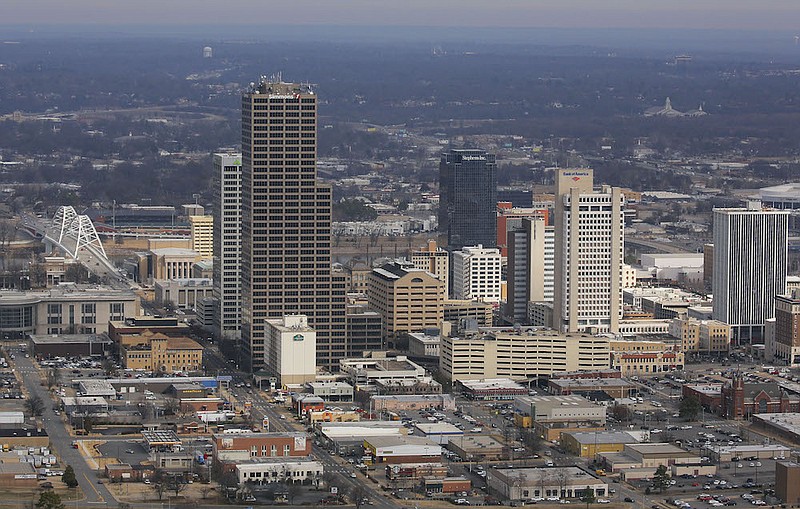The board president of the Downtown Little Rock Partnership in a recent letter to the Little Rock Board of Directors said that much of the city's downtown is in "a state of disrepair," impeding efforts to rebound from the covid-19 pandemic.
The letter from Carol Worley asked for an allocation of at least $1 million for downtown Little Rock from the city's latest tranche of American Rescue Plan Act funding.
"The struggle to regain our pre-2020 status is real," Worley wrote in the letter dated June 6. "This funding was given to the city to help make a difference in areas of need. Let's take this opportunity to use this money as intended and give the urban core of our capital city the attention it deserves."
Members of the city board are expected to vote soon on a plan for how to spend the lion's share of the second and final portion of $18.8 million from the federal government.
The covid-19 economic rescue package signed by President Joe Biden in March 2021 included $350 billion in direct aid for non-federal governmental entities like states, counties and cities, including Arkansas' capital.
Little Rock's total allocation of more than $37 million was the largest among all the cities in Arkansas receiving aid. The first half was received in May 2021.
City board members have heard two initial proposals for how to spend $12.35 million of the latest tranche: one from city staff that Little Rock's intergovernmental relations manager, Emily Jordan Cox, laid out recently, followed by another version from Ward 6 City Director Doris Wright.
Cox presented the proposed spending plan to board members on May 31.
Wright's spending plan was discussed at a board meeting Tuesday. Her resolution is set to be added to the board's agenda for possible action at this week's meeting, as long as enough of her colleagues vote in favor of the addition.
Both plans include money for a downtown master plan and other needs.
The version from city staff would allocate $500,000 for downtown capital needs and the master plan, but the Downtown Little Rock Partnership would be required to raise the money for any remaining costs related to the master plan.
Wright's version increased the sum for the downtown category to $1.5 million.
Following discussions with Wright, Little Rock Mayor Frank Scott Jr. suggested at the most recent city board meeting that officials might try to bring forward another spending proposal that incorporates items city officials can all agree on.
Downtown Little Rock has not had a master plan since Ottenheimer Market Hall in the River Market was completed in the early 1990s, according to Worley's letter.
"During the pandemic, our downtown, more so than everywhere else, was shut down. Offices were left vacant, restaurants were closed, small businesses discontinued operations and commercial spaces were abandoned," Worley wrote. "As you all know, our downtown is not rebounding from the pandemic like other areas of the city. It is unlikely it will with the current model we have in place."
Worley called for "a new path forward" for downtown Little Rock, referring to the need for ideas about rethinking land use as well as "hybrid ideas" for spaces to live and work.
"Something that will show us creative repurposing of existing buildings so that they will be functional and accommodating for all types of workers and employers," Worley wrote. "That's why the new master plan is so important."
She later wrote, "Our downtown businesses, hotels and restaurants are desperately trying to rebound from the loss of our downtown patrons. Sadly, a lot of our downtown area is in a state of disrepair, which impedes efforts of reactivating the area."
Worley suggested that bringing life back to the downtown ought to start at "eye level," and said that at a minimum, officials need to fix broken signs and lighting, repair potholes, repaint crosswalks and address graffiti, among other things.
She also argued that sprinkler systems for planters and streetscapes would reduce the manpower currently needed for watering.
"Better street lighting would allow for increased safety at night; more effective trash receptacles would help control our littered streets; and fixing the downtown potholes would be an immediately visible benefit to visitors, residents and workers," Worley wrote.
A minimum $1 million allocation for downtown Little Rock "would be a good start for many of these items, including the much-needed master plan," Worley wrote.
Worley is a local attorney with the firm Worley, Wood & Parrish.
In a phone interview Friday, she suggested that the master plan itself would be created by an outside firm and then the Downtown Little Rock Partnership would ideally "be able to help coordinate setting the things in motion to move in the direction of whatever the plan is."
She envisioned a separate group of developers and other key downtown players who could help officials focus on what they want with the master plan and assist with writing the request for proposals in order to identify the appropriate company.
The Downtown Little Rock Partnership is a nonprofit 501(c)(3) organization separate from Little Rock's municipal government that nevertheless receives significant funding from the city.
The city's 2022 budget approved late last year included an outside-agency allocation of $195,000 for the Downtown Little Rock Partnership in exchange for various services, up from $145,000 in the 2021 budget.
During the May 31 board meeting, at-large City Director Dean Kumpuris blasted the city's proposed allocation for downtown Little Rock from the second tranche of federal money for being too small.
At the time, Kumpuris said that "to me it is reprehensible that we're gonna spend $31 million on various projects and we think our downtown deserves half a million dollars, and then you're gonna say to people, 'Go raise the rest of the money to do a study.'"
Kumpuris and Scott serve as ex officio members of the Downtown Little Rock Partnership's executive board, according to the nonprofit's website.
